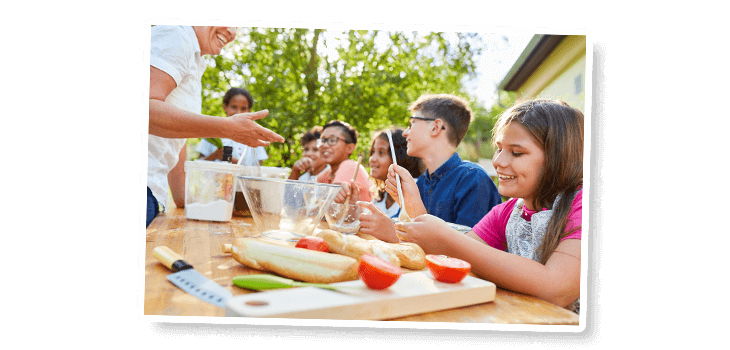With summer upon us, it’s the perfect time to break out of the mold in your homeschool approach. If you’re looking for an alternative to your usual routine, project-based learning could be a fun option. Project-based learning is an educational practice that uses real-life projects to sharpen core skills in math, science, language arts, and more. As a bonus, this method of learning can help build professional skills that your children will use throughout their adult years.
The following project-based learning ideas are long-term oriented, making them ideal summer learning goals. You’ll find that these activities build time management and extended research expertise as well as boost your kids’ imaginations as they discover new subjects and concepts.
We have organized these homeschool summer activities into grade levels for your convenience. Take your pick and begin a new adventure!
Elementary School Project-Based Learning Activities
Build a water garden: For this fun, meaningful activity, all you need is a water-tight half barrel or a sturdy pot or planter. Choose a few floating plants such as water hyacinths, and broadleaf plants like the giant arrowhead, elephant ear or calla lily. You could even have a few small fish. Kids can take pictures or record the different plants, their functions and different parts (roots, leaves, etc.). They can draw pictures and continue to care for the pond, plants and fish as the summer progresses. This activity focuses on biology, science, math, and botany – all subjects that can complement a child’s elementary school curriculum.
Have your child create a book: Did you know that the youngest published author was four years old? According to the Guinness Book of Records, Dorothy Straight, born in 1958, wrote How the World Began in 1962. How cool is that? Choose a summer theme, maybe family vacation, the July 4th holiday, or summer camp. Be sure to include drawings, pictures, and captions. Teach your child about the five components of a story: the characters, the setting, the plot, the conflict, and the resolution. Print it out at the end of the summer and put it together in a binder.
Middle School Project-Based Learning Ideas
Learn about the kitchen: The culinary arts can teach homeschoolers so many important life skills. Cooking/baking entails following directions and incorporates concepts from a number of subjects. According to The Academy of Nutrition and Dietetics, “Cooking is a valuable life skill that teaches children about nutrition and food safety, as well as building math, science, literacy and fine motor skills.” These are all important elements that are touched upon in your children’s middle school curriculum. When they’re executed correctly, the whole family gets a tasty reward!
Learn the art of photography or videography: Whether you’re traveling this summer or staying close to home, have your child capture all of the fun through photography or videography. They can create a slide presentation complete with music, motion graphics, and custom illustrations. They could also create their own videos using their phone or digital camera, and upload them to YouTube. Your kids will learn about editing, creating text overlays, content creation, storytelling strategies, problem solving and more.
High School Project-Based Learning Examples
Use social media: When parents think of social media, they don’t think about education. But project-based learning and social media can make a great combination. For example, use Facebook groups for live streaming educational lectures and discussions, or have your children start a summer-long blog where they write about educational topics. Your children will connect with other high schoolers who share common interests and passions, which will help them improve their writing, strategic thinking, and socialization skills. They could choose topics that have a connection with their high school curriculum subjects or focus on something different, such as a hobby.
Sign up for summer volunteer work: Community organizations are always seeking volunteers, and high school kids bring a unique energy and commitment that is highly sought after. Young volunteers learn time management, job responsibilities, social skills, teamwork, and collaboration. Volunteering builds confidence and gives your child a sense of purpose that reaches beyond their own world. They will make a difference and feel proud about their contributions. The homeschool project could be a diary or a scrap book that highlights their experiences. Your child can also prepare an oral presentation once they complete their work.
These project-based learning ideas will help boost your child’s life and core skills as they encounter new experiences, focus on their personal interests, and feed their curiosity. As a result, they’ll concentrate harder, become more thoughtful with the activities, and retain information better, in order to avoid the summer slide. When you give your kids full responsibility, you may notice how they jump at the chance – knowing that they’re in control. They take the initiative, ask the right questions, and make important decisions based on their research and hard work — all valuable skills that will help them succeed as they progress through their schooling and beyond.
Summer Learning Activities
Now’s the time to get ready for the season and hopefully with these ideas and resources you’re already one step ahead.






